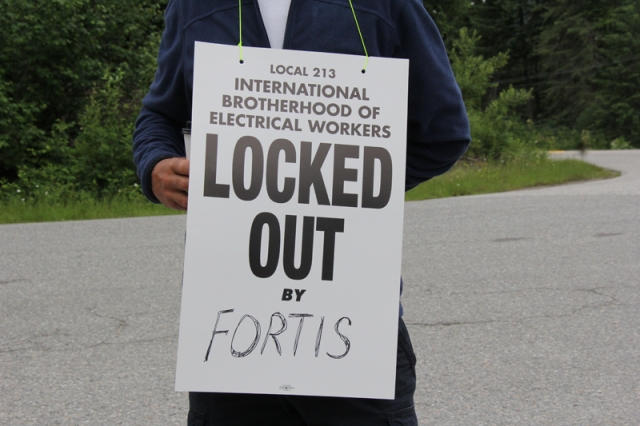Fortis/IBEW 213 lockout: No end near
By Suzy Hamilton, The Nelson Daily
Heading into the fifth week of a lockout, the business manager for the International Brotherhood of Electrical Workers 213 says skilled workers are leaving FortisBC over the labour dispute, which looks a long way from over.
“I have no idea how long it’s going to go,” IBEW Local 213 business manager, Rod Russell told The Nelson Daily from Kelowna.
“We don’t have a healthy relationship and there are a lot of grievances. Twelve employees have already quit and moved on.”
The 240 union members were locked out on June 26 after FortisBC applied to the B.C. Labour Relations Board in April to have certain services designated as “Essential Services,” and was granted the designation.
“We had safety concerns over two individuals and it escalated from there,” said Fortis BC communications officer Neal Pobran. “There are two ways to enact an essential services order, one is a strike and the other is a lockout.”
Those directly affected are employees on the electrical side of the company working in generation, transmission, and distribution operations.
Approximately 240 employees (all with FortisBC Electric) are affected by the lockout that stretches from Princeton to Creston and up through the Okanagan Valley to Winfield.
The two sides were bargaining since January when the existing collective agreement expired in February.
Talks continued until mid-March when, after negotiations and mediation provided no new agreement, the union filed strike notice.
At that point the companyapplied to the B.C. Labour Relations Board in April to have certain services designated as “Essential Services,” and was granted the designation.
According to Russell, the ball is in FortisBC’s court as the union has submitted a final offer to the company.
FortisBC then went directly to the employees with an offer that was rejected by 88 percent of the union membership.
The union offer calls for a three percent per year wage increase for three years, retroactive, a Family Day for employees and a leave provision with benefits for people like Russell who accept union positions.
“We already gave the company a concession,” said Russell. “The company wants to have full control of the job descriptions. Right now the parties have to agree on the job description,” he said. “There is some consternation among the members, but we are now asking that the company consult with us over the language.”
Job description is important, said Russell. For example, the company has set a technical diploma as a requirement for employment. “This is very problematic, it limits good internal people.”
Russell said the problem is that the company refuses to give a final offer.
“The company said there will be no adverse affects,” said Russell. “Unfortunately, there will be.” He cited longer outages, new connects and capital projects as a few areas where the lockout will be felt.
Currently there are approximately 60-70 trained managers handling the union workers jobs, Pobran said.
The essential services order will kick in and bring the workers back with situations like power outages at hospitals.
“We’re hoping through the Labour Relations Board we can come back to the table,” Pobran said.
Arbitration will be the next step if the parties cannot agree.
FortisBC has applied for a rate increase of 3.3 percent. The money the company saves through a lockout will be considered in the application.
“We’ll go through the regulatory process and put out all the costs,” Pobran said. “We’ll see where this comes on. Any savings we will pass on to the customers.”
“No one has seen their bills go down yet,” countered Russell.
Russell said the workers locked out earn an average of $85,000 a year with benefits. The last labour dispute between workers and the company took place in 2001 and lasted for four months.
Customers interested in finding out more about FortisBC rate increase application can go to www.bcuc.com for more information.

























